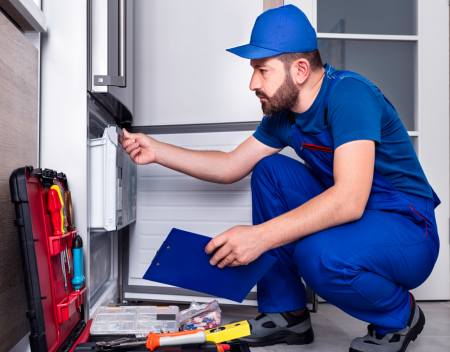Tipos de aparatos
- Aire acondicionado
- Automobile
- Chainsaw
- Circular Saw
- Lavaplatos
- Drills
- Secadora
- Drywall Screw Gun
- Horno
- Gas Fireplace
- Gas Grill
- Gas Patio Heater
- Grinder
- Heat Pump
- Impact Driver
- Impact Wrench
- Microonda
- Nailer
- Orbital Sander
- Calentadores de piscina
- Powerwall
- Distancia
- Refrigerador
- Television
- Lavadora
- Calentador de agua
Marcas de electrodomésticos
- A.O. Smith
- AccuCold
- Admiral Craft
- AGA
- Airrex
- Amana
- Ambiance
- American Range
- American Standard
- American Water Heaters
- Aquacal
- Armstrong
- Asko
- Avanti
- Avenlur
- Azure
- Beko
- Bellfires
- Bertazzoni
- Blackstone
- Blaze
- Blomberg
- BlueStar
- Bosch
- Bradford White
- Bromic
- Bryant
- Cafe
- Calcana
- Capital
- Carrier
- Char-Broil
- Char-Griller
- Chrysler
- Coates
- Coleman
- Comfortmaker
- Commercial Chef
- Continental
- Cosmo
- Cove
- Crown Verity
- Dacor
- Daikin
- Danby
- Danfoss
- DaVinci
- DCS
- Deco
- DeWALT
- Ducane
- Dyna-Glo
- Dyson
- EcoSmart
- Electrolux
- Element4
- Empava
- Equator
- Eurodib
- European Home
- Everdure
- Farberware
- Fhiaba
- FibroPool
- Fire Sense
- Fisher
- FiveStar
- Flare
- Flash Furniture
- Focus
- Ford
- Forno
- Forte
- Frigidaire
- Fulgor Milano
- Gaggenau
- GE
- General Motors
- GlowBrand
- Goodman
- Grundig
- GSW
- Haier
- Hayward
- Heatstar
- Heil
- Hestan
- Hisense
- Hitachi
- Hotpoint
- iio
- Ilve
- Impecca
- Ingignia
- Insignia
- JennAir
- John Wood
- Keeprite
- Kenmore
- Kenyon
- KitchenAid
- Kucht
- La Cornue
- Lennox
- LG
- Liebherr
- Lifetime
- Lion
- Luxaire
- Lynx
- Magic Chef
- Marvel
- Maytag
- McQuay
- MicroFridge
- Midea
- Miele
- Migali
- Monogram
- Montigo
- Mr Heater
- Napoleon
- Navien
- Nexgrill
- Noritz
- Panasonic
- Patio Comforts
- Payne
- Pentair
- Perlick
- PITT
- Premier
- Raypak
- Real Fyre
- Regency
- Reliance
- Rheem
- Rinnai
- Roma
- Ruud
- Saber
- Samsung
- Schwank
- Sharp
- Smeg
- Solas
- Sony
- Spartherm
- Speed Queen
- StaRite
- State Water Heaters
- Stiebel Eltron
- SubZero
- Summerset
- Summit
- SunGlo
- SunPak
- Sunpentown
- SunStar
- Superiore
- Takagi
- TCL
- TEC
- Tempstar
- Tesla
- Thermador
- Thor Kitchen
- Toshiba
- Town and Country
- Toyota
- Traeger
- Trane
- Twin Eagles
- U-Line
- Unique
- Vaillant Group
- Valor
- Verona
- Victory
- Viessmann
- Viking
- Vizio
- Weber
- Westinghouse
- Whirlpool
- Whynter
- York
- ZLINE
Categorías de artículos
- Aire Acondicionado
- Cuidado de los electrodomesticos
- Appliance News
- Dishwasher News
- Maquinas de secado
- Hornos
- Gas Fireplaces
- Microondas
- Calentadores de piscina
- Frigorificos
- Estufas - Cocinas
- Trucos y consejos
- Lavadoras
- Water Heaters
Más artículos
My Refrigerator is not Cooling, What Could Be the Problem?

If your refrigerator is not cooling, it can be a frustrating and inconvenient problem. There are a few different issues that could be causing your refrigerator to stop cooling, and identifying the specific problem is the first step in finding a solution. In this article, we will discuss some common causes of a refrigerator not cooling and provide some tips for troubleshooting and fixing the problem.
One of the most common reasons a refrigerator may stop cooling is a malfunctioning compressor. The compressor is responsible for circulating refrigerant through the cooling system, and if it is not working properly, the refrigerator will not be able to cool down. There are a few signs that the compressor may be the problem, including loud or unusual noises, a lack of cool air, and a buildup of heat around the compressor. If you suspect that the compressor is the issue, it is recommended to unplug the refrigerator and call a professional for repair.
Another possible cause of a refrigerator not cooling is a faulty thermostat. The thermostat controls the temperature of the refrigerator, and if it is not functioning properly, the fridge may not be able to maintain the correct temperature. To test the thermostat, you can use a multimeter to check the continuity of the thermostat's contacts. If the contacts are not functioning properly, the thermostat may need to be replaced.
A clogged or dirty condenser coil can also cause a refrigerator to stop cooling. The condenser coils are responsible for dissipating heat from the refrigerant, and if they are clogged or dirty, they may not be able to function properly. To check the condenser coils, you can remove any debris or dust that may be blocking them, or you can use a condenser coil brush to clean them. It is also a good idea to check the air flow around the coils to ensure that there is enough space for the heat to dissipate.
A malfunctioning evaporator fan can also cause a refrigerator to stop cooling. The evaporator fan is responsible for circulating cool air throughout the fridge, and if it is not working properly, the fridge may not be able to maintain the correct temperature. To check the evaporator fan, you can listen for any unusual noises or check to see if the fan is spinning freely. If the fan is not functioning properly, it may need to be replaced.
A faulty seal on the door can also cause a refrigerator to stop cooling. If the seal is not sealing properly, cold air can escape and warm air can enter the fridge, causing the temperature to rise. To test the seal, you can try closing the door on a piece of paper and see if it is able to be pulled out easily. If the seal is not sealing properly, it may need to be replaced.
If your refrigerator is not cooling and you are unable to identify the problem, it is recommended to call a professional appliance repair service for assistance. They will be able to diagnose the issue and provide a solution to fix the problem.
In conclusion, there are several different issues that can cause a refrigerator to stop cooling. By identifying the specific problem and taking the appropriate steps to fix it, you can get your refrigerator back up and running in no time. Whether it is a malfunctioning compressor, faulty thermostat, clogged condenser coils, malfunctioning evaporator fan, or faulty door seal, there is a solution to every refrigerator problem. If you are unable to identify and fix the issue on your own, it is always a good idea to call a professional for assistance.

If your refrigerator is not cooling, it can be a frustrating and inconvenient problem. There are a few different issues that could be causing your refrigerator to stop cooling, and identifying the specific problem is the first step in finding a solution. In this article, we will discuss some common causes of a refrigerator not cooling and provide some tips for troubleshooting and fixing the problem.
One of the most common reasons a refrigerator may stop cooling is a malfunctioning compressor. The compressor is responsible for circulating refrigerant through the cooling system, and if it is not working properly, the refrigerator will not be able to cool down. There are a few signs that the compressor may be the problem, including loud or unusual noises, a lack of cool air, and a buildup of heat around the compressor. If you suspect that the compressor is the issue, it is recommended to unplug the refrigerator and call a professional for repair.
Another possible cause of a refrigerator not cooling is a faulty thermostat. The thermostat controls the temperature of the refrigerator, and if it is not functioning properly, the fridge may not be able to maintain the correct temperature. To test the thermostat, you can use a multimeter to check the continuity of the thermostat's contacts. If the contacts are not functioning properly, the thermostat may need to be replaced.
A clogged or dirty condenser coil can also cause a refrigerator to stop cooling. The condenser coils are responsible for dissipating heat from the refrigerant, and if they are clogged or dirty, they may not be able to function properly. To check the condenser coils, you can remove any debris or dust that may be blocking them, or you can use a condenser coil brush to clean them. It is also a good idea to check the air flow around the coils to ensure that there is enough space for the heat to dissipate.
A malfunctioning evaporator fan can also cause a refrigerator to stop cooling. The evaporator fan is responsible for circulating cool air throughout the fridge, and if it is not working properly, the fridge may not be able to maintain the correct temperature. To check the evaporator fan, you can listen for any unusual noises or check to see if the fan is spinning freely. If the fan is not functioning properly, it may need to be replaced.
A faulty seal on the door can also cause a refrigerator to stop cooling. If the seal is not sealing properly, cold air can escape and warm air can enter the fridge, causing the temperature to rise. To test the seal, you can try closing the door on a piece of paper and see if it is able to be pulled out easily. If the seal is not sealing properly, it may need to be replaced.
If your refrigerator is not cooling and you are unable to identify the problem, it is recommended to call a professional appliance repair service for assistance. They will be able to diagnose the issue and provide a solution to fix the problem.
In conclusion, there are several different issues that can cause a refrigerator to stop cooling. By identifying the specific problem and taking the appropriate steps to fix it, you can get your refrigerator back up and running in no time. Whether it is a malfunctioning compressor, faulty thermostat, clogged condenser coils, malfunctioning evaporator fan, or faulty door seal, there is a solution to every refrigerator problem. If you are unable to identify and fix the issue on your own, it is always a good idea to call a professional for assistance.




